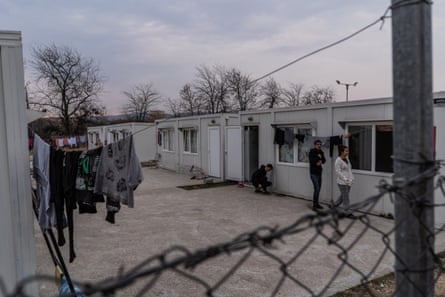The UK government’s migration plans are facing an imminent challenge this week, with lawyers seeking to overturn deportations to Bulgaria due to allegations of brutal conditions faced by migrants and asylum seekers in the country.
There have been more than 24,000 returns – both enforced and voluntary – from Britain since Labour’s election victory in July 2024, according to government figures. More than 200 people were returned to Bulgaria in 2024.
The UK government has ad hoc arrangements with some countries, including Bulgaria, allowing it to return asylum seekers when there is a record of their entry into that country.
However, lawyers are seeking to challenge cases of individuals deported from the UK and European Union countries back to Bulgaria, warning that returnees face treatment that may breach article 3 of the European convention on human rights, which prohibits torture and inhuman or degrading treatment.
In January, the Guardian reported allegations of the Bulgarian authorities ignoring emergency calls and obstructing efforts to rescue three Egyptian teenage boys, who later died in sub-zero temperatures near the Bulgaria-Turkey border in late December. The Bulgarian interior ministry said its border forces had reacted in a timely manner to reports of young people in distress, but that the bodies were found in different locations to those initially provided.
In December 2024, the Guardian reported on evidence that Bulgaria was attempting to force Syrian asylum seekers out of the country by pressuring them into signing “voluntary return” documents, sometimes with the use of violence. Bulgaria’s state agency for refugees denied that anyone was forced to return to their country of origin.
This week, No Name Kitchen (NNK), a humanitarian organisation working with refugees in the Balkans, said it had collected the testimonies of 21 people, including 17 Syrians, returned to Bulgaria from other European countries, and found more than two-thirds of them had subsequently been put under pressure to sign “voluntary return” documents.
A young Syrian woman, who was deported from Germany to Bulgaria, said officials in Bulgaria put pressure on her to sign a “voluntary” return agreement to send her back to Syria and said she was threatened by authorities with 18 months in detention if she refused.
Another respondent deported from the UK said he had been beaten up by Bulgarian police multiple times, which resulted in a broken nose.
George Sheldon Grun, a public-law caseworker from Duncan Lewis Solicitors, said the firm was representing several Syrians who were challenging their removal to Bulgaria in British courts.
“Reports from organisations on the ground indicate that Syrian refugees in Bulgaria frequently face conditions that amount to degrading and inhumane treatment. The UK government considers Bulgaria a safe country for return, but the reality for those removed suggests otherwise.
“These cases raise serious questions about the adequacy of protection and whether removal to Bulgaria is consistent with the UK’s legal obligations,” the lawyer said.

In its country update in March 2025, the European Council on Refugees and Exiles expressed concerns that accommodation conditions fell below “basic standards”. It said problems included infestations of vermin and a failure to provide essential services such as adequate food and hot water, as well as clean and functional sanitation facilities.
The fate of those deported back to Bulgaria from other European countries was “concerning”, said Ana Carolina Fisher da Cunha, a human rights lawyer and co-author of the NNK report.
“Bulgaria’s asylum system is failing, and it does not uphold the human rights standards it is legally bound to as an EU member state. European countries can no longer justify returns to Bulgaria under the pretence that it is a safe destination,” she said.
“The reality is that people sent back to Bulgaria face serious risks of torture and other inhumane and degrading treatment, not just upon return to their countries of origin but within Europe’s own borders. Returns to Bulgaria must end.”
A Home Office spokesperson said: “As the public rightly expects, anyone unlawfully in the UK with refugee status in another country will be removed and returned back to that country if deemed safe to do so.”
The Bulgarian interior ministry was approached for comment.
Source: theguardian.com


